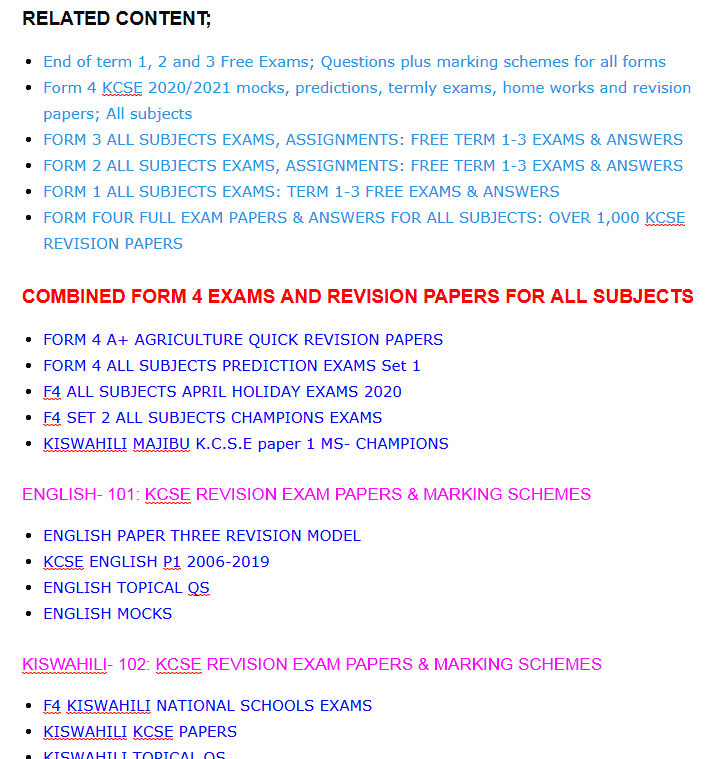ENGLISH TEACHING NOTES FREE
ENGLISH NOTES
NOUNS
These are words that name things ,people, ideas, qualities ,state and places.
Examples:
- People-John, Jack
- Ideas-stone, desk, laptop
- Qualities-bravery, kindness, greed, diligence
- State-sickness, laziness, poverty, wealth, love.
- Places-Nairobi, Mombasa, Kisumu
Nouns can be divided into different categories.
Types of nouns
- Proper nouns
- Common nouns
- Concrete nouns
- Abstract nouns
- Collective nouns
- Countable nouns
- Uncountable nouns
Download more free unlimited English resources here: Educationnewshub.co.ke
SCHEMES OF WORK FORM TWO ENGLISH TERM 1-3
ENGLISH GRAMMAR AND POETRY NOTES
English free lesson plans for all topics (Form one to four)
ENGLISH GRAMMAR NOTES FOR F1-4: SIMPLIFIED
ENGLISH GRAMMAR FORM 4 ASSIGNMENTS
FORM ONE ENGLISH LESSON PLANS FREE
KCSE ENGLISH PAPER 1 PREDICTION QUESTIONS & ANSWERS
English Functional Skills writing notes, exams, revision questions and samples
Free updated Secondary Lesson Plans for all subjects

- Common nouns
These are names of ordinary things. They include;
- Boy
- Girl
- Locker
- Desk
- Water
Some common nouns have antonyms. They include:
- shepherd-shepherdess buck-doe(goat,rabbit)
- Bullock-heifer wizard-witch )
- Drone-bee heir-heiress
- Horse-mare manager-manageress
- jack-jennet(donkey) tomcat-queen
- Bachelor-spinster jew – jewess
- monk-nun ram-ewe(sheep
- cock-hen stallion-mare(horse)
- Nephew-niece poet-poetess
- Proper nouns
These are names given to specific people, places or things. They are always used with capital letters as follows;
- Names of people ; Winston, Jacob, Melvin.
- Months of the year; January, February, March.
- Days of the week; Monday, Tuesday, Wednesday.
- Seasons of the year; Winter, Spring, Autumn, Summer.
- Names of countries and continents ; America, Kenya, Australia, Europe.
- Names of regions, states and districts; Mombasa County, Nyanza , Califonia
- Names of cities towns and villages; Naivasha, Nairobi, Kochia.
- Geographical areas; The North, The North.
- Concrete nouns
These are nouns naming things that can be seen and touched. The refer to:
- People-boy, girl, teacher
- Animals- cat, elephant, cow
- Things-table, phone, cup
- Geographical features-mountain, rivers, valleys
- Abstract nouns
Abstract nouns are nouns naming things one cannot see or touch.
They refer to:
- States; pain sickness, pity, poverty, wealth, success
- Quality; honesty, greed, cruelty,
- Ideas; education, corruption, love, hatred, justice
- Count nouns/countable nouns
These are names of things which can be counted.
They have singular and plural forms.
They can be used with articles and numerals.
- A Pen- pens
- A Book-books
- Paper-papers
- Chair-chairs
- Flower-flowers
f)Non-count /uncountable nouns
These are nouns of things that cannot be counted.
They cannot be used with articles such as a/an or the.
They can be used with expressions like some, a handful of, a bit of, a lot of, much .
Examples
- Substances ;salt, food, dust
- Liquids; milk, water, oil, juice
- Ideas; music, knowledge, information, education, advice
- Concrete objects; bedding, luggage, furniture, hair ,grass
- Qualities; happiness, kindness, courage, obedience
Regular and Irregular nouns
- Regular nouns
Regular nouns are nouns are nouns that form their plural by adding s or es to their singular forms.
Examples
Desk-desks
Pen pens
Box-boxes
Buffalo-buffaloes
- Irregular noun
These are nouns that form their plural by changing their forms or certain letters.
Examples
- Nouns that change oo to ee
- Tooth-teeth
- Goose-geese
- Foot-feet
- Nouns that omit us and add i
- Radius-radii
- Cactus-cacti
- Stimulus-stimuli
- Syllabus-syllabi/syllabuses
- Alumnus-alumni
- Nouns that omit um and replace it with a
- Agendum-agenda
- Addendum-addenda
- Curriculum-curricula
- Stratum-strata
- Stimulus-stimuli
- Nouns that change I to ee
- Basis-bases
- Oasis-oases
- Thesis-theses
- Crisis-crises
- Nouns that change on/n to a
- Criterion-criteria
- Phenomenon-phenomena
- Nouns that add ee
- Larva-larvae
- Formula-formulae
- Nouns that change x to -ces
- Matrix-matrices
- Index-indices
Collective nouns
These are names of groups of people, animals or things.
They take a singular verb since each individual making up the group is seen as part of a single unit.
Examples
- A brood of chickens a clan of hyenas
- A dole of doves a cohort of zebras
- A mews of hawks a bike of bees
- A parliament of owls a flight of butterflies
- A flight of pigeons a cloud of grasshoppers
- A battery or journalists a colony of wasps
- A run of poultry a clutter of spiders
- A congress baboons a troupe of performers
- A leap of leopards a house of senators
- A pride of lions a panel of experts
- A troop of monkeys a herd of harlots
- A gang of buffaloes a gaggle of women
- A coalition of cheetahs a clutch of eggs
- A flink of cows a bed/bouquet of flowers
- A pack of dogs a plague of locusts
- A colony of rabbits a scourge of mosquitoes
- A herd of donkeys a den of snakes
- A herd of elephants an army of frogs
- A stable of horses a nest of vipers
- a school of whales a cast of actors
- a bench of bishops an orchestra of musicians
- a crowd of people a band of robbers
- a crew of sailors a board of directors
- a flock of tourists a fleet of cars
- a galaxy of stars a cache of jewels
Compound nouns
These are nouns made up of more than one word.
They may be written as single words, two separate words, that have to be used together to give the right meaning and they may also be hyphenated.
- Single words
- Kickback Shopkeeper
- Necklace Toothpaste
- Sunshine Airport
- Heartburn Nosebleed
- Football Breakthrough
- Classmate Takeaway
- Workshop Teapot
- Dressmaking Cupboard
- Two/three separate words
- Leather jacket dining hall
- Tap water driving license
- Bank account cow dung
- Ice cream frying pan
- Assistant minister ladies’ shoes
- Deputy head children’s wear
- Coat of arms
- Hyphenated words
- Mother-in-law
- Commander-in-chief
- Table-mat
- Father-in- law
- Sergeant-at-arm
- Attorney-general
- Passer-by
- Door-bell
Plurals of Compound nouns
Plurals of compound nouns are formed in various ways:
- Adding a plural marker to the last part of the compound noun
- Shopkeepers
- Necklaces
- Workshops
- Teapots
- Bank accounts
- Leather jackets
- Deputy heads
- Adding the plural ending after the first part of the compound noun
- Coats of arms
- Mothers-in-law
- Commanders-in-law
- Passers-by
- Attorney-generals/attorneys-general
- Sergeants-at-arm
NOUN PHRASES
A noun phrase is a group of words that functions as as a noun(unit)
It may comprise of a noun, a pronoun or a noun and other words modifying it.
These modifiers may include:
- Article; a/an and the
- Demonstratives; this, that, these, those
- Possessive adjectives; my, his, their, our
- Quantifiers; all, some, many, few, a lot, no
- Numerals; two, three, four
- Adjectives; good, handsome, beautiful
Examples of noun phrases
Noun
Corruption
Poverty
John
Nouns +articles
The cow
An umbrella
A dog
Noun + demonstrative
This cow
That jug
Noun + possessive adjective
My vehicle
His book
Noun +quantifiers
Some people
Many students
Noun + numerals
Two students
Three ladies
Noun + adjective
Handsome boys
Dirty pigs
Article + adjective + noun
The lonely pig
Article + numeral + adjective
The three dirty pigs
Functions of noun phrases
- As a subject
A noun phrase is used as a subject if:
-it appears before the main verb
-it refers to the initiator of the action stated by the verb.
- As complement
A subject complement is a word/phrase that describes/defines the subject of a sentence. They follow copular/ linking verbs. These verbs include ;am, was, are, were, been, become, appear, seen, sound and feel.
- As an object
a)Direct object
A direct object is a word, phrase or clause that follows a transitive verb and answers the question ”who” or “what?”
A direct object receives the action of the of the verb.
b)Indirect object
An indirect object is a word/phrase that answers the question “to whom?” or “for whom” or for what is the action of the verb performed. Indirect object is the beneficiary/receives something or benefits from something.
CLAUSES
A clause is a group of words contain a subject and a verb(predicate)
It can form either a sentence on its own, or be part of a longer sentence.
Types of clauses
- i) Independent clause
These are also called main clauses, they are clauses that can stand on their as sentences.
Examples
- Susan likes reading.
- The guest speaker spoke for only 20 minutes.
- We saw our local M.P at baraza.
- Literature courses are offered at the university.
- ii) Coordinating clause
If two or more independent clauses are joined to make a sentence , each sentence is called a coordinating clause. This clause comprises sentences of equal importance but they work together.
Each coordinating clause is connected to the other using a coordinating conjunction(fanboys)
Examples
John likes to play football but Joseph plays volleyball.
iii) Dependent/subordinate clause
These are clauses that depend on independent clauses to be meaningful.
They do not express a complete thought and cannot stand on their own.
These clauses are used with subordinate conjunctions such as : if, although, before, while, as, until unless, despite ,since etc
Examples
Unless you read newspapers, you cannot be informed.
Although I revised well, I failed terribly.
NOUN CLAUSES
A noun clause is a subordinate clause that does the same work as that of a noun phrase.
It has a subject and a verb and may be used as a subject or an object of a sentence.
Noun clause are introduced by words such as when, that, whoever, how, where, whoever, which, who, how, why and whatever.
Examples
- Whoever finishes the race will get the reward.
- Whoever ordered the books is not in today.
- She told me to give the guests whatever they needed.
- He understood what we discussed.
- When to vote will be decided on by the commission.
- That they failed irritates them.
- How you spend the money is up to you.
- He said that the teacher had arrived.
Types of noun clauses
- That noun clause
- That the world is round is known.
- I know that you can pass.
- That I love football is known.
- That we shall die is known.
- Wh-noun clauses
What she did was seen.
Functions of noun clauses
Subject of a sentence
Object of a sentence
Complement
NOUN DERIVATIONS
Noun derivation is the process of forming nouns from other lexical categories(words) by adding affixes(prefixes, suffixes, infixes)
Nouns are formed by adding prefixes to verbs ,adjectives or nouns
Prefixes are elements added at the end of words
Examples
- -er -ment -less
- -ee -ion -ive
- -ness -tion -able
- -ship -ence -ation
- -ism -dom
- -ity -ize/ise -or
- Nouns derived from verbs
By adding –er
- Dance-dancer
- Write-writer
- Drive-driver
- Winner-winner
By adding –ee
- Retire-retiree
- Escape-escapee
- Train-trainee
- Pay-payee
- Refer-referee
- Absent-absentee
Divorce-divorcee
By adding –or
- Guarant-guarantor
- Act-actor
- Stress-stressor
- Donate-donator
- Educate-educator
- instruct-instructor
By adding –ation/-ition
- Educate-education
- Attend-attention
- Repeat-repetition
- Admit-admission
- Discuss-discussion
- Receive-reception
By adding –ment/ent
- Require-requirement
- Involve-involvement
- Acknowledge-acknowledgement
- Employ-employment
By adding –ance/ence
- Accept-acceptance
- Admit-admittance
- Allow-allowance
- Assure-assurance
- Comply-compliance
- Defy-defiance
- Guide-guidance
- Maintain-maintenance
- Clear-clearance
- Adhere-adherence
- Patient-patience
- Exist-existence
By adding –al
- Survive-survival
- Deny-denial
- Bury-burial
- Dismiss-dismissal
- Rehearse-rehearsal
By adding –age
- Marry-marriage
- Waste-wastage
- Break-breakage
- Use-usage
By adding –ery
- Deliver-delivery
- Bribe- bribery
- Nouns derived from adjectives
By adding –ness
- Kind-kindness
- Stubborn-stubbornness
- Shy-shyness
- Happy-happiness
- Keen-keenness
- Open-openness
By adding –ism
- Tribe-tribalism
- Material-materialism
- Critic-criticism
- Race-racism
- Skeptic- skepticism
By adding –ery
- Brave-bravery
By adding –ity
- Equal-equality
- Similar-similarity
- Sane-sanity
- Curious-curiosity
- Brief-brevity
By adding
- Nouns derived from nouns
By adding-ship
Friend-friendship
- King-kingship
- Relation-relationship
- Leader-leadership
- Friend-friendship
- Author-authorship
- Owner-ownership
Censor-censorship
By adding –dom
- King-kingdom
- Martyr-martyrdom
- Chief-chiefdom
By adding –ery
- Slave-slavery
PRONOUNS
Pronouns are words used in place of pronouns.
Person and number
Personal pronouns are divided into three classes:
- First person pronouns
These are pronouns that refer to the person who is speaking/writing
They include:
| singular | plural |
| I | we |
| me | us |
- Second person pronouns
These are pronouns that refer to person who is listening or reading.
They include:
| singular | plural |
| you | you |
- Third person pronouns
These pronouns that refer to the person being spoken about.
They include:
| singular | plural |
| He/him | They/them |
| She/her | They/them |
| it | They/them |
Pronouns that refer to the doer of the action are called subject pronouns. They include:
I, we, you, he, she, it and they.
Pronouns that refer to the recipient/receiver of the action are called object pronouns. They include:
Me, us, you, him, her, it and them.
Indefinite Pronouns
Indefinite pronouns are pronouns which do not refer to definite number of things or people. They refer to things in general without identifying them.
Examples
- everybody several
- Everyone one
- Nobody either
- Anyone all
- Nobody many
- Somebody few
- None both
- Someone some
Indefinite pronouns can be categorized into:
Singular indefinite pronouns
Plural indefinite pronouns
i)singular indefinite pronouns
These are indefinite pronouns that refer to one person/thing.
Examples
- Nobody everybody
- Someone none
- Anyone someone
- Somebody another
- Another each
- Everybody neither
Singular indefinite pronouns take singular verbs such as has, is, and says.
- ii) Plural indefinite pronouns
These are indefinite pronouns that refer to more than one person or thing.
Examples
- All
- Many
- Few
- Both
- Several
These take plural verbs such as are, were, have
Indefinite pronouns can be made to be gender sensitive by using his/her.
Pronouns and Case
A case is different positions that pronouns take in a sentence. They can take the subject or the object position.
- i) Subjective Case
A pronoun is said to be in subjective case when it appears before/precedes a verb.
Examples
- He will always remember this.
- She teaches Geography.
- They are in college.
Pronouns used in subjective case include: I, we, you, he, she, it and they.
| Person | singular | plural |
| 1st | I | we |
| 2nd | you | you |
| 3rd | He/she | |
| it |
NB: Pronouns in subjective case are also used in comparison after than.
She is taller than he.
ii)objective case
A pronoun is said to be in the objective case when it appears/comes after the verb or preposition.
Examples
- John loves her
- I am waiting for him.
Pronouns used in objective case are:
| Person | singular | plural |
| 1st person | me | Us |
| 2nd person | You | you |
| 3rd person | Him | |
| Her | They | |
| it |
NB: Relative pronouns also take either subjective case.
Who is used in the subjective case; it refers to the doer of the action.
Example
This man who gave me a gift.
Whom is used as an object; it refers to the recipient of the action.
It can also be used with prepositions.
Example
- The man whom I wanted to see is in Narok.
- The woman to whom I wished to speak was away.
- I saw the people for whom you work.
The student whom you sent home has returned.



